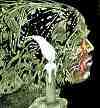
Idle Theory
Much of Western philosophy of the past 400 years or more has begun with subjective experience. The philosopher looked within. He began with his own personal existence, his sensory experience, his passions and instincts and desires and pleasures. As he saw it, what was done by men was defined by their psychology. Understand the human heart, and you would understand human behaviour.
The enquiries of the philosophers have been largely unsuccessful. Entire schools of philosophers have marched into the swamps of subjective enquiry, and vanished without trace. The Utilitarian philosophers made Pleasure the only good, and their economic followers constructed a calculus of Happiness.
But science has been no more successful. Any number of expeditions into the wide deserts of empirical science, in search of some handle on human nature, have got lost. "Scientific" socialism was one such attempt, if in name only. The Darwinian theory of evolution, with its sociobiological successors, represents another foray. Freudian psychology was an attempt at a mechanics of mind. Behaviourism also.
Science hasn't abandoned the attempt to come to grips with human nature. But it seems to be felt, within scientific circles, that the advance of science into these matters will only make progress once the physical operation of the human brain is understood. Underlying this is a variant of philosophical subjectivism: understand the working of the human brain, and you will understand human behaviour.
There are philosophical objections, furthermore, to any attempt by science, which deals with facts, to say anything about values. It is held to be impossible to draw prescriptive conclusions from descriptive premises - that you cannot derive an 'ought' from an 'is'. Or it is held that, unlike the inert matter with which science largely deals, human beings have freedom of choice in the ways they act, and that this freedom nullifies any attempt by science to discover regular laws of human behaviour.
Idle Theory is a new attempt to find a passage across the scientific desert. In Idle Theory, human beings, and indeed all forms of life, acquire and expend energy. There is nothing novel about this approach. What is peculiar to Idle Theory, however, is its supposition that life is not continually busy acquiring the energy it expends, but is only intermittently busy. Plants are only able to capture solar energy during daylight hours, and most grazing animals and their predators are observed not to be continually grazing or hunting, and modern Western human society is not wholly devoted to finding food and shelter. The proportion of time that they are not busy - what Idle Theory terms their idleness - represents a buffer against emergency, and in human life provides the idle time which underpins all play, art, music, literature, conversation, study.
Idle Theory's suggestion is that life does as little as possible to maintain itself. In this sense, life conforms to Least Action principles that are used in science (for example, to describe the path taken by diffracted light.) The process of evolution, it is supposed, is one by which more idle lifeforms replace less idle ones. There is a natural premium on increasing idleness. Human life, which is another variety of natural life, is not exempt from this evolutionary pressure, and is primarilly concerned with minimizing necessary work. Labour-saving technology, developed over millions of years, has been the uniquely human method by which human idlesness has been increased. Human evolution is largely the evolution of tools. Economic systems are tool trading systems. Human social organization, customs and laws, it is suggested, all owe their origin to the requirement to increase idleness.
Idle Theory's approach to human life is one of natural history.

